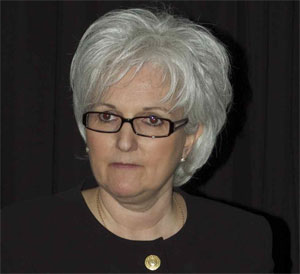
Where are all the women in security?
Jennifer Brown
News Be prepared to stretch beyond your comfort zone, have the confidence you can do the job and take risks.
Be prepared to stretch beyond your comfort zone, have the confidence you can do the job and take risks.
Those were some of the words of advice provided by Annick Tremblay, Security Director, Facility Manager with GlaxoSmithKline Biologicals and Carol Osler, Vice-President Global
Security and Investigations with TD Bank to the Women in Security Ontario group, which gathered April 20 at Ryerson University.
“If you don’t picture yourself doing the job, you will fail,” Tremblay told the audience of about 75 who attended the evening event in Toronto called “The Path to a Successful Career in Security.”
Tremblay, who has also served as Deputy Director, Corporate Security at Laval University, Chief of Safety at Sobeys and an operative with the Canadian Security and Intelligence Service (CSIS), is a criminologist with 20 years experience.
She talked about the challenges of working in the security industry as a woman and the importance of being confident and selling yourself to those around you.
“If I believe in something, other people will too; it’s about selling yourself,” she said. “Patience and listening is very important in this career. If you want to be a good manager, you’re as good as your team and you have to listen to your team.”
Tremblay says the biggest mistake women make in their careers is worrying too much.
“As women we are always worrying. During my 20s I worried that any decision I made would have irrevocable consequences and there was only one path. The truth is that there are many paths and what looks like a setback today may next year turn out well. What’s more important is women who can make a difference and how much you can really affect the world around you,” she said.
Osler has 30 years experience in the security industry and has worked in senior roles at Sun Life, Ontario Hydro and Ontario Power Generation. She started her career with the Toronto Housing Authority, working as a guard at the age of 19.
“I think I’ve had the best career in security in Canada and you can be assured there is a career for you in security,” she told the group.
Osler pointed out that women account for a small percentage of the total security workforce. In a recent workforce survey, 13 per cent of respondents were women. In a similar study conducted in 2007, 11 per cent of respondents were women.
“This is a big industry and those numbers are low,” said Osler. “Women don’t understand the opportunities available to them in this profession. We need women to understand the security profession is more than guard service and uniforms.”
Osler addressed the general impression that security jobs don’t pay well. However, specific security roles earn an average of $55,000, well over the national average of $32,000. Security executives can earn salaries comparable to other executive roles, in the $200,000+ range.
She said anyone entering the security industry needs to view the security department as a business enabler, helping the organizations they work for perform better and encourage everyone in the company that they are responsible for security as well. To provide value, the security department can no longer be the department found “near the boiler room.”
Security practitioners today who expect to make a difference need to demonstrate business acumen, people skills, the ability to manage and communicate well with others both verbally and in writing.
“Companies are taking more risk to get more market share and the security risks have become more complex. There is a global need for people in this industry,” she said.
When it comes to women in leadership roles, Osler says science has found that women “prefer leading over ruling” and have more “interactive relationships” with their teams.
So why aren’t there more women in the security industry?
“Women tend to wait until they have all the skills sought for a position before they apply for a role. Men tend to feel they are qualified if they have half the skills noted in a job posting,” says Osler. “Women need to find a way to find a balance here.”
Osler offered some tips to women seeking a career in the field of security:
• Focus on special interests such as risk management, protection services, technology or governance
• Believe you are as talented as your male counterparts
• Don’t get bogged down in the mechanics of security
• Consider mentoring
• Network
Tremblay also offered advice to help cope with what can be a very busy and stressful career.
“I put time in my agenda for myself. When you are always in crisis mode it’s not good. I take time to refocus on my career, my team, my vision, and myself. Even if I just take an hour for myself it is worth it because I am refocusing.”
Print this page
Leave a Reply